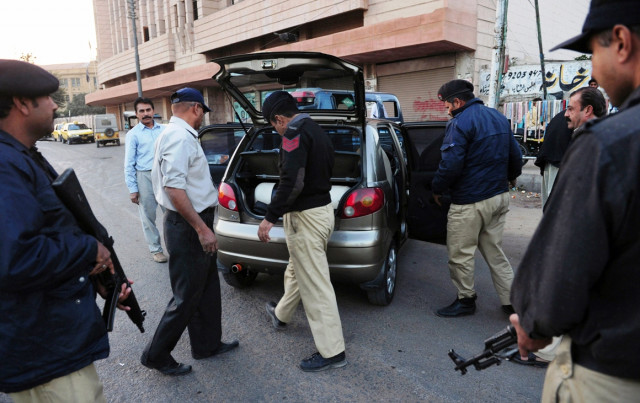Terror and chaos in Karachi
reconciliation between PPP, MQM in Karachi over accusations made about target killings.

The killers have become sensitive to media reporting too, murdering Geo News reporter Wali Khan Babar before shooting and injuring ANP leader Bashir Jan in Orangi Town. As if to indicate the triangular nature of the urban war, victims included the PPP’s secretary district west, Naveed alias Noori, two MQM workers, Hammad and Zafar Sheikh, while two from the ANP had been attacked earlier.
Karachi has ample evidence of terror linked to the activity of bhatta (protection money) by criminal gangs who use murder as an instrument of persuasion. The reign of terror at Pehelwan Goth was still fresh in the minds of Karachiites when the courts exonerated those accused of killings, allowing them to walk free because of lack of evidence. The police have frequently used sign language to make the case that their work is greatly hampered by the fact that ruling politicians are involved in this score-settling homicide; yet the killing patterns reveal the presence of organisations other than the linguistic-ethnic ones. The last surge of target killing took place in mid-December, putting an end to the impression that killing stops every time federal interior minister Rehman Malik visits the city bearing an olive branch from PPP chief Asif Ali Zardari. This time the olive branch was bigger in size than ever before; yet the triangular spree of violence has swelled instead of going down. Pakhtun-dominated settlements — Sohrab Goth, Quaidabad, Banaras, Keamari, Jangabad, Luqman Colony, Machar Colony, Yasrab Colony, Maymar Complex, Decent Complex, Al-Asif Square, Gulshan-e-Akakhel, Quetta Town and New Sabzi Mandi — have often seen violence, indicating that the ANP doesn’t control and direct the entire Pakhtun community, most of whom originate not in Khyber-Pakhtunkhwa but in Mehsud-dominated South Waziristan.
Sectarian killing is also rampant and recently the reverse-trend of killing Sunni doctors alerted the stricken people of Karachi to the rise of Lashkar-i-Muhammad. In 2008, the Tehreek-i-Taliban Pakistan (TTP) boasted that it had the capacity to control and rule Karachi. Its linkages to the madrassa network of Karachi are well-known. And madrassa-linked religious ‘high threat’ groups in Karachi, too, are known to the outside world: al Qaeda (Qari Zafar Group), the Tehreek-i-Taliban Pakistan, Lashkar-e-Jhangvi and the Sipah-i-Sahaba Pakistan. The medium threat groups are: Sipah-i-Muhammad Pakistan (SMP), Harkatul Mujahideen al Alami, Harkatul Jihad al Islami, the Tehreek-i-Islami Lashkar-i-Muhammadi and Jandullah.
Ethnic politics has solidified in Karachi and social scientists say ethnic-based conflicts take a long time dying off. But two other developments starting in the 1980s have complicated the situation: the early quartering of al Qaeda in the city — a majority of the Arab terrorists surrendered to the US by Musharraf were caught from Karachi — and the pouring in of overseas money into the seminaries which proliferated and may stand at 3,000 today.
The pressure from the ethnic grassroots is such that the ruling trio has succumbed to it, instead of cooperating to put it down. All three political parties are secular in outlook and opposed to al Qaeda and the Taliban. When they are targeted by religious terrorists, other than in Karachi, they tend to stand up for them against one another. Benazir Bhutto was meant to die in Karachi, not in Rawalpindi, and the killers were directed from South Waziristan. A workable solution to this will only materialise when the three parties who rule the city can act in a non-partisan manner and purge their ranks of those in cahoots with various mafias.
Published in The Express Tribune, January 16th, 2011.


1724319076-0/Untitled-design-(5)1724319076-0-208x130.webp)
















COMMENTS
Comments are moderated and generally will be posted if they are on-topic and not abusive.
For more information, please see our Comments FAQ